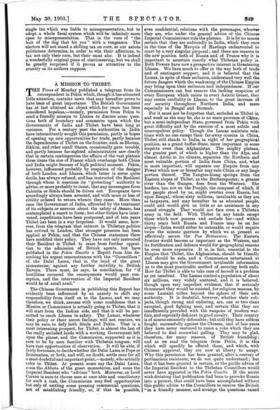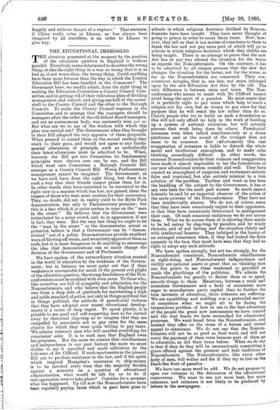A MISSION TO THIBET. T HE Times of Monday published a
telegram from its correspondent in Pekin which, though it has attracted little attention, contains news that may hereafter prove to have been of great importance. The British Government has at last attained an object which for years has been considered hopeless,—namely, permission from Pekin to send a friendly mission to Lhassa to discuss some ques- tions both of boundary and commerce upon which the Governments of India and Thibet have been long at variance. For a century past the authorities in India have intermittently sought this permission, partly in hopes of opening up new opportunities for trade, partly because the dependencies of Thibet on the frontier, such as Bhotan, Sikkim, and other small States, occasionally gave trouble, and partly because far-sighted administrators saw clearly that in certain contingencies the affairs of the vast plateau three times the size of France which overhangs both China and India might become of high political moment. Pekin, however, influenced probably by suspicion of the designs of both London and Lhassa, which latter is never quite docile, has always refused, and has instructed the Resident through whom it exercises its ".protecting " authority to advise, or more probably to insist, that any messengers from Calcutta or Simla should be driven out. Europeans have accordingly always been arrested, and with more or less of civility ordered to return whence they came. More than once the Government of India, affronted by the treatment of its subjects or nervous about the safety of Assam, has contemplated a resort to force ; but other duties have inter- vened, expeditions have been postponed, and of late years Thibet lias been in a way forgotten. It would seem, how- ever, from the telegram that interest in Thibetan politics has revived in London, that stronger pressure has been applied at Pekin, and that the Chinese statesmen there have modified their policy. They have not only instructed their Resident in Thibet to cease from further opposi- tion to the admission of British agents, but have published in the Pekin Gazette a Report from him de- scribing his urgent remonstrances with the "Councillors" of the Dalai Lama, that is, the head of the great monasteries, against any further incivility to British Envoys. There must, he says, be conciliation, for " if hostilities occurred the consequences would pass con- ception, and the intervention of the Imperial Resident would be of small avail."
The Chinese Government in publishing this Report has evidently been influenced by an anxiety to shift any responsibility from itself on to the Lamas, and we may therefore, we think, assume with some confidence that a Mission or Commission is actually going to Thibet, that it will start from the Indian side, and that it will be per- mitted to reach Lhassa in safety. The Lamas, whatever their policy or their secret feelings, will not venture, we may, be sure, to defy both Simla and Pekin. That is a most interesting prospect, for Thibet is almost the last of the really secluded lands with a working Government left upon the planet, and the Commission, supported as it is sure to be by men familiar with Thibetan tongues, will have rare opportunities of observation. It will be able, if fairly fortunate, to decide whether the Dalai Lama is Pope or Incarnation, or both, and will, no doubt, settle once for all a most doubtfuland important point,—namely, who actually rules in _Thibet. At present. some say the Dalai Lama, some the Abbots of the great monasteries, and some the imperial Resident who "advises" both. Moreover, as Lord Curzon is sure to choose men at once able and conciliatory for such a task, the Commission may find opportunities but only of settling some pressing commercial questions, not of establishing friendly, or, if that be possible, even confidential, relations with the personages, whoever they are, who under the general advice of the Chinese Imperial Commissioner rule the plateau. It is by no means certain that they are unfriendly to India, which they once in the time of the Marquis of Hastings endeavoured to court by a very singular proposal ; and there are reasons in the new position both of Russia and of France why it is important to ascertain exactly what Thibetan policy is. Both Powers have now a prospective interest in threatening Lhassa. We have much to offer in the way both of trade and of contingent support, and it is believed that the Lamas, in spite of their seclusion, understand very well the future dangers which the weakening of the Chinese Empire may bring upon their seclusion and independence. If our Commissioners can but remove the lurking suspicion of every European which exists in every Asiatic breast, they may create cordiality in Lhassa, to the great increase of our security throughout Northern India, and more especially in Bengal and Burmah.
For it must not be forgotten that, secluded as Thibet is, and weak as she may be, she is no mere province of China, but a semi-independent State, governed from Pekin with great difficulty and by the exercise of a most subtle and unscrupulous policy. Though the Lamas maintain rela- tions with no one except their far-away cousins in China, Thibet still stands to India, in right of her geographical position, as a grand buffer-State, more important in some respects even than Afghanistan. The mighty plateau, the greater part of which is higher than the Alps, and almost Arctic in its climate, separates the Northern and most valuable portion of India from China, and, what is more important, will separate our Empire from any Power which now or hereafter may rule China or any large portion thereof. The Yangtse-kiang springs from the Eastern slopes of Thibet, as the Burhampooter, a greater river than the Ganges, does from the Western. She borders, too, not on the Punjab, the conquest of which, if her people stood by us, might overtax even Russia, but upon Bengal, whose sixty millions, invaluable as they are as taxpayers, and may hereafter be as educated people, could and would give us little or no assistance in any armed struggle. They would not face even a Thibetan army in the field. With Thibet in any bands except those which now possess and seclude her—and within thirty years both Russia and France may be on her slopes—India would either be untenable, or would require twice the minute garrison by which we at present so effectively secure the Pax 'Britannica. The Eastern frontier would become as important as the Western, and its fortification and defence would for geographical reasons be even more expensive. It is, in fact, essential to the Empire that Thibet, like Afghanistan, should be friendly and should be safe, and a Commission entertained at Lhassa may give the Government invaluable information as to the most practicable method of securing both ends. How far Thibet is able to take care of herself is a problem as yet unsolved. The Lamas control a population of about six millions, very widely scattered, and it is believed, though upon very imperfect evidence, that if seriously threatened they would be assisted, for religious reasons, by some' Lamaist tribes beyond the sphere of their own authority. It is doubtful, however, whether their sub- jects, though strong and enduring, are, one or two clans excepted, good fighting men, and certain that they are insufficiently provided with the weapons of modern war- fare, and especially deficient in good cavalry. Their country is of course eminently defensible ; but still they have seldom fought successfully against the Chinese, and of late years they have never ventured to resist a voke which they are believed to find somewhat galling. They may be glad, therefore, for many reasons, of British friendship ; and as we read the telegram from Pekin, it is this which will speedily be offered them, and which, with Chinese approval, they are now at liberty to accept. Why this permission has been granted, after a century of pertinacious resistance, we do not quite understand ; but that it has been granted is certain, or the pacific advice of the Imperial Resident to the Thibetan Councillors would never have appeared in the Pekin Gazette. If the secret wish dictating that publication had been to provoke Russia into a protest, that could have been accomplished without this public advice to the Councillors to receive the British " in a friendly manner, and arrange the questions raised happily and without danger of a rupture." That sentence, if China really rules in Lhassa, as has always been imagined by all travellers, is an order to Lhassa to give way.







































 Previous page
Previous page